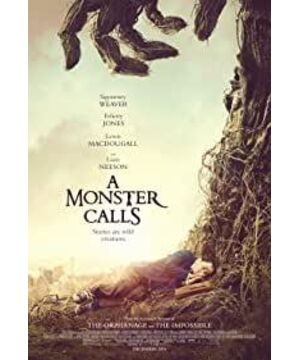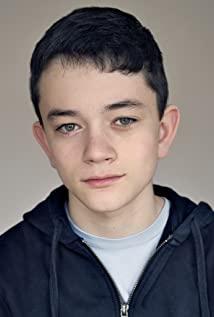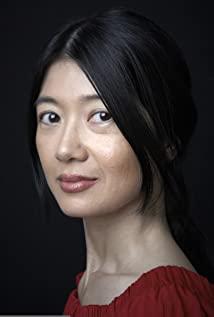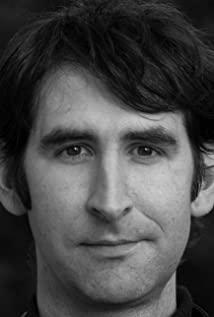I watched the movie "When the Monster Knocks on the Door" on a laptop with a 13-inch screen. The small screen and poor sound effects couldn't hide the light of the movie. It was a good movie.
The movie tells three fairy tales with the help of monsters (tree spirits), plus the experience of the male protagonist Connor, it can be said that a total of four stories are told, four stories about human nature.
The three fairy tales of monsters are similar to "The Little Prince", which I like very much. They all subvert the traditional routine of "justice overcomes evil" and "good people die well". They contain cruelty but are closer to reality. They are all fairy tales written for adults. Different from the subtle and euphemism of "The Little Prince", the three fairy tales of the monster more crudely and directly reveal the complexity of human nature and the indistinguishability of good and evil in human society.
01 The first fairy tale: the prince who is both good and evil
The monster's first fairy tale concerns a prince who is quite popular. The prince was brave and good at fighting, and was deeply loved by the people, but for power, he murdered the innocent (the innocent was still his nominal lover), weaved lies, blamed others, incited riots, and gained the right to rule, and since then he has been loved by the people even more.
So the question is, who is the bad guy? Who is the good guy? For the fool, the answer is too clear, the prince is the perfect good man, and the queen is the complete villain; for the idealist who is clear-headed, understands the truth, and has a strong sympathy, this question does not seem to be difficult to answer, fairy tales to the queen There is very little explanation, and it is impossible to judge whether it is good or bad, but the prince is sinister and cruel, and he is a complete bad guy.
These two types of people seem to be at two completely different extremes. In fact, they have one thing in common, that is, childishness. In their eyes, there are only two kinds of people, good people and bad people. It's just that stupid people can still "discover" many perfect and good people with this dichotomy because of their ignorance, so they are very happy; while a clear-headed idealist can hardly find good people with this dichotomy, so they are very pessimistic about human beings, Living is often painful.
The male protagonist of the movie first questioned why the monster kept the queen's life, and then asked why the monster did not punish the prince. His two types of thinking represent the first two types of naive people. But in fact, human beings are a complex species intertwined with good and evil, or the definition of good and evil is ambiguous, and even the great evil under the traditional moral standard seems to have a reason to exist.
Therefore, for mature-minded people, they may not be too obsessed with the issue of "who is good and who is bad". Through this fairy tale, the monster seems to want to tell the boy two things: don't be blinded by the appearance of things; human nature is intertwined with good and evil.
02 The second fairy tale: the priest and the pharmacist
The monster's second fairy tale is about the entanglement of a priest and a pharmacist. The contradiction between them is a bit like the Chinese medicine battle that has been going on in China for many years. Pastors like Fang Zhouzi and other anti-TCM factions (but their reputation is far better than the current Chinese anti-TCM faction), and pharmacists are like TCM schools (but their reputation is far worse than At present, China is very Chinese).
The pastor exposed the pharmacist's greedy personality and false medical skills at the meeting, and prevented the pharmacist from collecting medicinal materials. Of course, the pharmacist also held a grudge against the pastor. Because the priest had better prestige among the people, he had an advantage in the battle, but this advantage was destroyed by the disease of the priest's daughter.
I remember in a TV show, an old Chinese medicine doctor asked Fang Zhouzi: If your child is sick and Western medicine is ineffective, would you choose Chinese medicine? Frankly speaking, even though I don't like Fang Zhouzi very much, I still think that to be able to ask this kind of question shows that this old Chinese medicine practitioner is very poor in tutoring and cultivation.
Fang Zhouzi's answer to this question was decent. He said: Will I choose traditional Chinese medicine, just like whether I will choose to worship God. The implication is that I don't believe in traditional Chinese medicine, just like I don't believe in the existence of ghosts, but when I feel helpless, I may give it a try for the sake of my children.
I'm sure that's the way most parents deal with this kind of problem, as is the case with the fairy tale priest who tried to seek the help of a pharmacist after his two sick daughters failed modern medicine.
The narrow-minded pharmacist took the opportunity to blackmail him, and the priest who was eager to save the girl agreed.
This kind of practice is very vicious, it not only rejects others, but also makes oneself seem very righteous. In the end, the priest's daughter died of illness, the monster destroyed the priest's house, and the priest should have died as a result.
As for the second fairy tale, I don't think the movie's arrangement of "letting" the monster to destroy the vicar's house doesn't quite make sense. Monster Destruction Priest still uses the reason why the pharmacist rejected the Priest - "abandoning the faith".
If this fairy tale is seen from the perspective of a priest, it is parting with a loved one, similar to the situation of the hero of the movie. With the pastor's knowledge or belief, he actually knew that there was no hope of curing his daughter's disease, and he knew even more that the pharmacist had no ability to treat his daughter's disease. He just couldn't accept the fact that her daughter would die.
To deny this reality, pastors must renounce their beliefs. From the time he asked the pharmacist for help, he had given up his beliefs, and the pharmacist just forced him to speak out and then took the opportunity to humiliate him. It is not wise for the pastor to give up his faith. Not only will he not be able to save his daughter, but he will suffer even more.
For a religious believer, it may be a shame or even a sin to renounce your beliefs, but it seems understandable to do so when your beloved daughter is in danger, and people who have been parents should be able to understand. Moreover, compared to the pharmacist who is desperate and falls into the trap, the priest has no reason to be punished, or the pharmacist has more reason to be severely punished by "justice".
So I feel like it would make more sense if the movie "let" the priest turn out on his own. Because I haven't read the original, I don't know how the original dealt with this ending. Of course, if the original intention of the movie or even the original book is to create a monster with "complex human nature" in both good and evil, or use this monster as a metaphor for people's inner strength, such an arrangement would be understandable.
What I'm questioning here is just this detail in the film, and I think it's true for the priest's complete failure in the fight. In human history, the main reason for the losing side in a battle at any period may be due to insufficient strength, wrong timing, major decision-making mistakes, etc., but "lack of justice" will definitely not be the main reason.
The so-called victory of justice is just that the winners put money on their faces, or it is an expectation of the kind people. Considering the predicament of the male protagonist (the mother is terminally ill), the main meaning expressed by the monster to the male protagonist through this fairy tale is: Facing the final separation of the relatives, you should stick to your beliefs, and sticking to beliefs may not be able to keep your relatives, but Giving up your faith not only doesn't help, it often makes things worse.
03 The third fairy tale: transparent man
The third fairy tale of the monster is simply about the male protagonist himself. The transparent man finds that even if he does not cast the transparent magic, people still ignore him. When he does not exist, people are unwilling to talk to him, play with him or even bully him. Finally, the transparent man broke out.
The strong empathy made the male protagonist also explode, and he violently attacked the tall boy who said "never bully him again" and "make him a transparent person". Using this fairy tale, the monster seems to want the male protagonist to recognize some of the problems in his dealings with people and face it squarely.
04 The life of the male protagonist: the energy of love
The male protagonist in the movie gradually grew up with the three fairy tales told by the monster. The male protagonist gradually became strong, rational, and mature. He began to reconcile with his father, his grandmother, and himself. The movie intersperses the three fairy tales with the real life of the male protagonist. The male protagonist's life does not contain the villains and life-and-death struggles in the fairy tales, which are similar to the lives of many of us ordinary people.
School violence, separation of loved ones, serious illness of loved ones, mutual complaints with relatives, guilt towards relatives, love and killing with relatives, mutual confrontation between reality and ideals, we may have seen and experienced these situations with our own eyes. When the situation appears in the movie, it always evokes some memories, some imagination about my own life.
In our memories and imaginations, our hearts are sometimes very heavy or even uncomfortable, and the so-called heart touching should be these. When I was young, when I heard others talk about being moved by a certain movie, I often couldn't understand it, thinking that the speaker was too hypocritical. Unexpectedly, as I get older, I find that sometimes I am really touched by a movie, a book, a story or even a scene, and sometimes I even feel heartache.
When the male protagonist heard that his father said he was going to take him to Los Angeles, the male protagonist was very happy, thinking that his father would take him by his side forever. But he was angry and disappointed when he realized that Dad just wanted him to spend Christmas. The male lead's father said that he loved the male lead's mother, but he finally left her; the male lead's father said that he loved the male lead, but could not keep him with him forever, because the house was too small and the current wife did not Agree; the father of the male protagonist said that his mother who loves the male protagonist also loves the male protagonist, but love is not everything.
Maybe going back a few years, this kind of plot can only make me swipe with contempt and disdain, but now when I see this scene, I seriously look at the expression of the male protagonist's father, I can almost see him full of Full of guilt, helplessness, and pain, I actually feel a little distressed for this poor man. It's not that he doesn't want to, it's not that he doesn't love, it's that he really can't, love sometimes really loses to reality.
The male protagonist in the movie is full of expectations for his father at first, and then resents after the expectation is shattered, and finally reconciles. Maybe part of the reason is that he understood the meaning of the fairy tale. His father was not perfect or even strong enough. His father was wrong but he did love him. His father also had his father's helplessness. reconciliation.
Misunderstanding, conflict and reconciliation have also been experienced between the male protagonist and the grandmother. The scene where the male protagonist broke out because he was depressed for too long at his grandmother's house left a deep impression on me. After the male protagonist smashed his grandmother's living room in a hysterical manner, when he saw her grandmother came back, his face was first with fear (worrying that her grandmother would punish him), but when he saw her hysterical because of her pain, his face was more sullen. Guilt.
Love and kill between relatives is like this. Sometimes we attack our relatives with some resentment, and even prepare to deal with the relatives’ counterattack, and finally find out with guilt that our relatives are only in pain but have no intention of fighting back. The male protagonist finally knows that his grandmother is not an enemy, just like the queen in fairy tales is not actually an evil witch. Later, his grandmother said: We are not used to getting along with each other, but we learn how to get along because we have a common lover (the male lead's mother).
The male protagonist once had nightmares every night, and the reason was his pain and self-blame. His mother is the person who loves him and he loves the most. Her mother is terminally ill, which is already painful, and the thought that occasionally pops out of his heart is even more painful. The idea is: end it early.
An early end to all this, of course, would also mean an early death of the mother. This kind of occasional thought made him deeply remorse, how could a person let a loved one who loves him the most and who he loves the most die prematurely? This self-blame made him more painful, he often had the same nightmare, he was holding his mother's hand on the cliff, he seemed to know that he couldn't save her, he was reluctant to let go and a little wanted to let go...
His mother's terminal illness made him blame himself and even hate himself. Fortunately, a monster is saving him, teaching him how to face the difference between life and death from his loved ones. He finally forgave his seemingly cruel idea and reconciled with himself.
Life is a one-way journey towards death, death is the end of everyone, cherishing the moment and loving the person you love is far more important than trying to hold a life tightly (and it can't be held at all) .
The most touching thing in the movie is the deep maternal love of the male protagonist's mother. The male protagonist's mother is obviously not a perfect mother, unable to give her children a superior life, or even to protect them from school violence. But like many ordinary mothers, she tried her best to protect her children. This kind of tragic dedication is even more touching.
The male protagonist's mother gave up her young ideals for the male protagonist and was willing to be a single mother. When she was seriously ill and her time was short, once the male protagonist was angry and didn't talk to her. She comforted her son and said: If one day you regret ignoring your mother today, you have to say "it's okay" to yourself, mother Understand, my mother really doesn't mind. Perhaps only parents and children have such moving comfort.
At the end of the movie, the male protagonist looks at the picture book hand-painted by his mother in his childhood in the room where his mother lived in his childhood. There are big trees, monsters, and even those fairy tales in the picture book.
I think the movie is here to tell the audience implicitly: It's not the monster who tells the story to the hero, but the hero's mother. After the male protagonist's mother was terminally ill, with her love for her son, she persistently completed the last stage of education, allowing her son to face the good, evil, beauty and ugliness of human nature and his own inner fears, reconcile with others and himself, and become stronger and stronger. Mature.
It is true that love is not omnipotent, but it is absolutely impossible without love, especially for the growth of children. May all the parents with dedication and love in the world be healthy!
View more about A Monster Calls reviews











